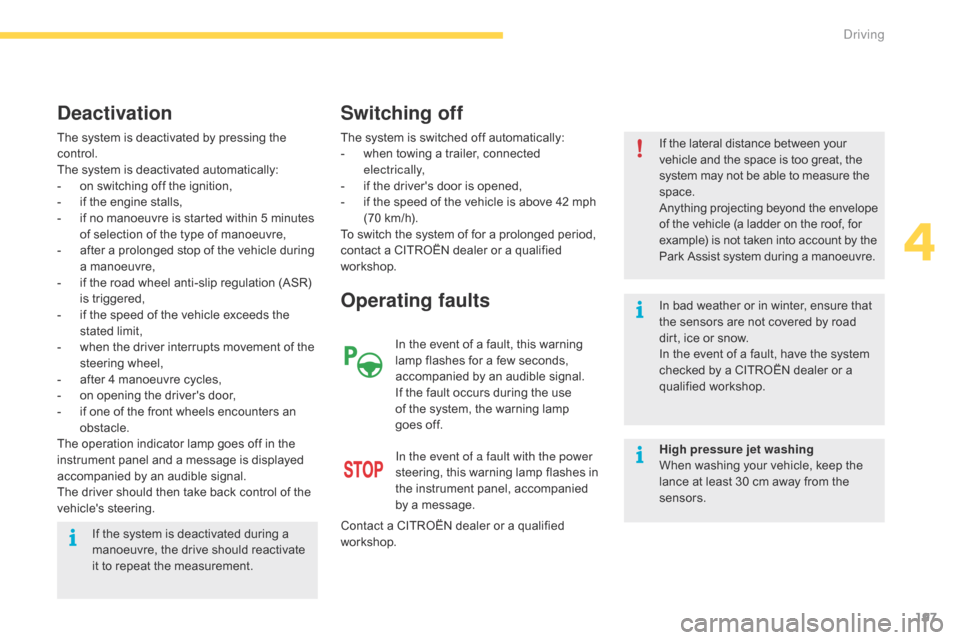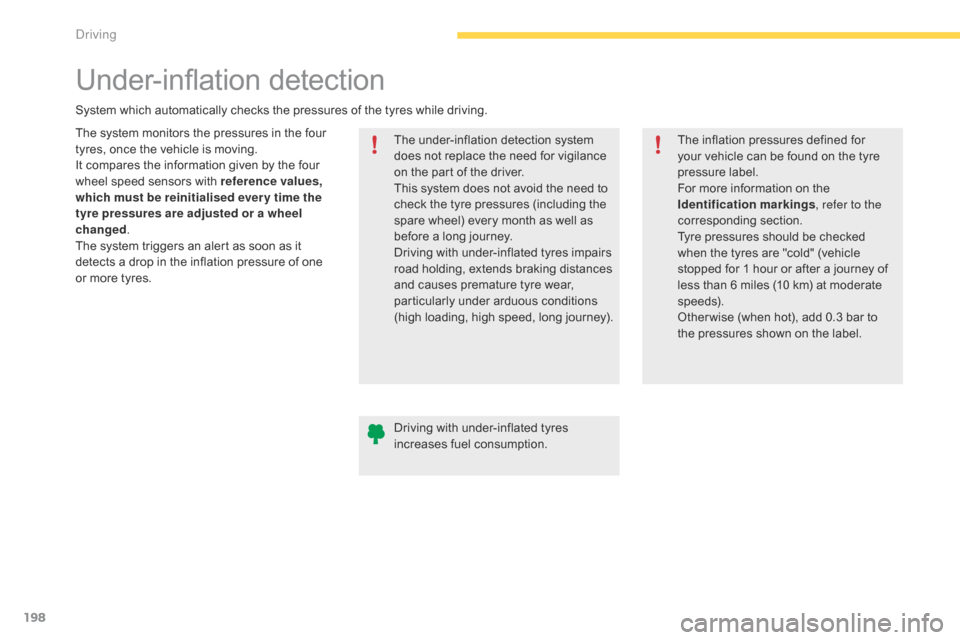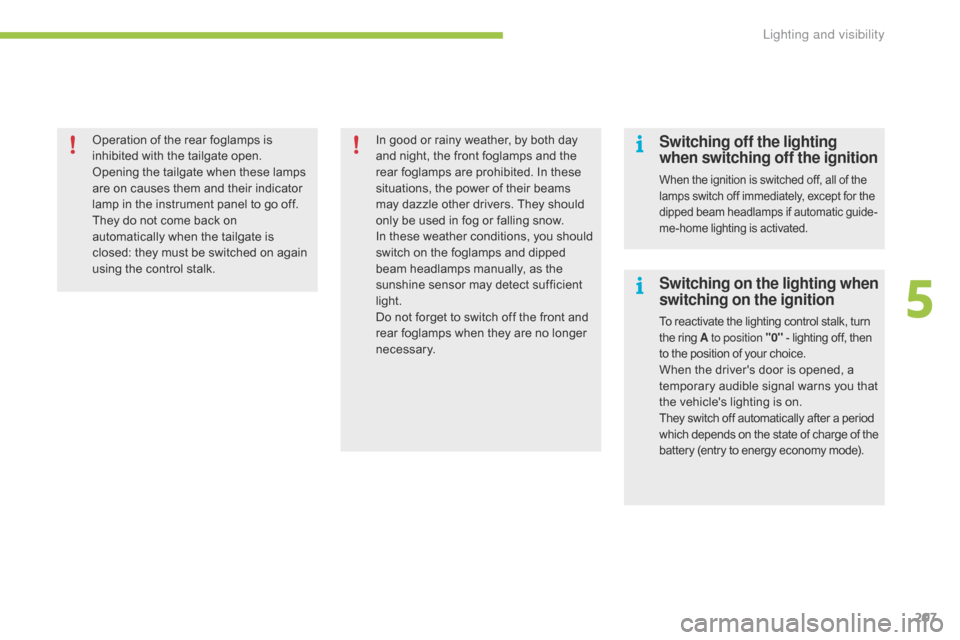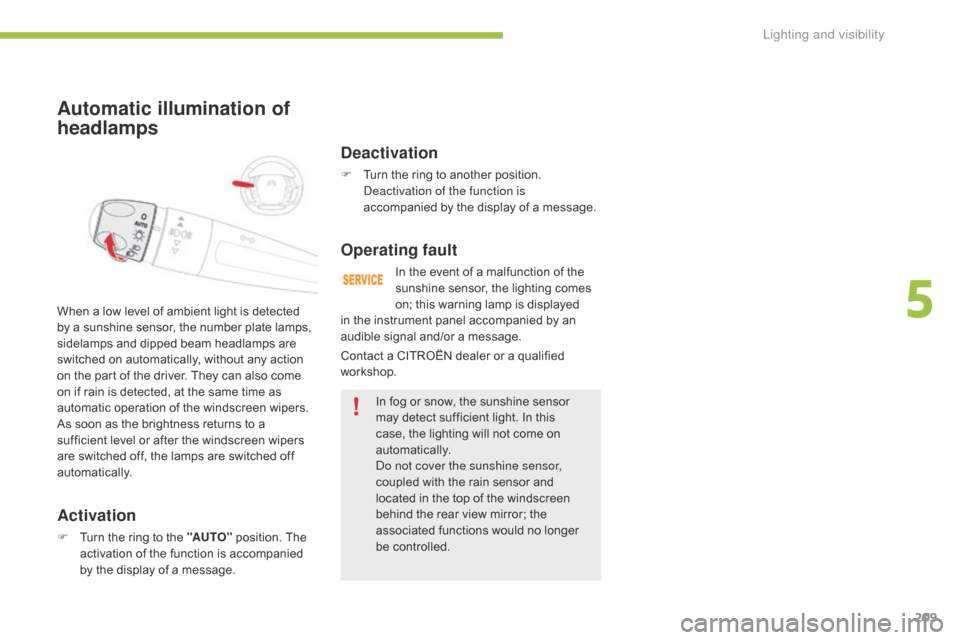sensor Citroen GRAND C4 PICASSO RHD 2016 2.G User Guide
[x] Cancel search | Manufacturer: CITROEN, Model Year: 2016, Model line: GRAND C4 PICASSO RHD, Model: Citroen GRAND C4 PICASSO RHD 2016 2.GPages: 523, PDF Size: 13.63 MB
Page 192 of 523

190
Park Assist
This system provides active assistance with parking. It detects a parking space then
o
perates the steering to park in the space.
It
operates the steering while the driver
m
anages the accelerator, brakes, gears and
c
lutch (manual gearbox). During phases of
e
ntry into and exit from a parking space, the
s
ystem provides visual and audible information
t
o the driver in order to make the manoeuvres
s
afe. It may be necessary to move for wards
a
nd backwards more than once. During
a manoeuvre the steering
w
heel turns quickly: do not hold the
s
teering wheel, do not place your hands
b
etween the spokes of the steering
w
heel and take care with loose and
b
ulky clothing, scarves, handbags...
T
here is a risk of injury.
When
Park Assist is activated, it
p
revents a change to STOP mode of
S
top & Start. In STOP mode, activation
o
f Park Assist restarts the engine.
The
Park Assist system cannot in any
c
ircumstances replace the need for
v
igilance on the part of the driver.
The
driver must remain in control
o
f their vehicle ensuring that the
s
pace remains clear throughout the
m
anoeuvre.
In
some circumstances, the sensors
m
ay not detect small obstacles located
i
n their blind spots.
The
driver can take control at any time by
g
ripping the steering wheel. The
Park Assist system provides assistance for t
he following manoeuvres:
A.
E
ntry into a parallel parking space
B.
E
xit from a parallel parking space
C.
B
ay
par
kingThe
Park Assist system takes control
o
f the power steering for a maximum
o
f 4 manoeuvre cycles. The function
i
s deactivated after these 4 cycles.
I
f you think that your vehicle is not
p
ositioned correctly, you should then
t
ake control of the steering to carry out
t
he manoeuvre.
The
Park Assist system cannot work
w
ith the engine off.
Driving
Page 193 of 523

191
The sequence of manoeuvres and the driving instructions are displayed in the
in
strument
pan
el. You
should always check the s
urroundings of your vehicle before
s
tarting a manoeuvre.
The assistance is
deactivated:
the display of
t
his symbol indicates that
t
he steering manoeuvres
a
re no longer controlled by
t
he system: you must take
c
ontrol of the steering.
The assistance is
activated:
the display of this
s
ymbol and a speed limit
i
ndicate that the steering
m
anoeuvres are controlled
b
y the system: do not touch
t
he steering wheel. The
park sensors function is not
a
vailable
d
uring
par
king
spa
ce
m
easurement. It intervenes later when
m
anoeuvring to warn you that your
v
ehicle is approaching an obstacle: the
a
udible signal becomes continuous
w
hen the obstacle is less than thirty
centimetres
aw
ay.
If
you have deactivated the parking
s
ensors, they are automatically
r
eactivated during assisted parking
m
anoeuvres.
Activation
of Park Assist inhibits the
b
lind spot monitoring system.
4
Driving
Page 195 of 523

193
F Move for wards slowly until a message is d
isplayed, accompanied by an audible
s
ignal, asking you to engage reverse gear.
F
S
elect reverse, release the steering wheel
a
nd start moving without exceeding 4 mph
(
7 km/h). F
T he assisted parking manoeuvre is in p
rogress.
W
ithout exceeding 4 mph (7 km/h), move
f
or wards and backwards, aided by the
w
arnings from the "Parking sensors"
s
ystem, until the indication of the end of the
m
anoeuvre.F
A t the end of the manoeuvre, the operating i
ndicator lamp goes out in the instrument
p
anel, accompanied by a message and an
a
udible
s
ignal.
T
he assistance is deactivated: you can
t
ake over control.
4
D
Page 198 of 523

196
F Select reverse, release the steering wheel a
nd start moving without exceeding 4 mph
(
7 km/h).
F
T
he assisted parking manoeuvre is in
p
rogress.
W
ithout exceeding 4 mph (7 km/h), follow
t
he instructions displayed in the instrument
p
anel, aided by the warnings from the
"
Parking sensors" system, until the
i
ndication of the end of the manoeuvre.At
the end of the manoeuvre, the operating i
ndicator lamp goes off in the instrument panel,
a
ccompanied by a message and an audible
s
ignal.
The
assistance is deactivated: you can take
ov
er control.During
parking and exit from p
arking manoeuvres, the reversing
c
amera function may come into
o
peration. It facilitates monitoring of
t
he surroundings of the vehicle, by
d
isplaying additional information in the
in
strument
pan
el.
For
more information on the Reversing
camera ,
refer to the corresponding
s
ection.
During
a bay parking manoeuvre, the
P
ark Assist system is automatically
d
eactivated once the rear of the vehicle
i
s within 50 cm of an obstacle.
Driving
Page 199 of 523

197
The system is deactivated by pressing the control.
The
system is deactivated automatically:
-
o
n switching off the ignition,
-
i
f the engine stalls,
-
i
f no manoeuvre is started within 5 minutes
o
f selection of the type of manoeuvre,
-
a
fter a prolonged stop of the vehicle during
a
manoeuvre,
-
i
f the road wheel anti-slip regulation (ASR)
i
s
t
riggered,
-
i
f the speed of the vehicle exceeds the
s
tated limit,
-
w
hen the driver interrupts movement of the
s
teering
w
heel,
-
a
fter 4 manoeuvre cycles,
-
o
n opening the driver's door,
-
i
f one of the front wheels encounters an
o
bstacle.
The
operation indicator lamp goes off in the
i
nstrument panel and a message is displayed
a
ccompanied by an audible signal.
The
driver should then take back control of the
v
ehicle's
s
teering.
Deactivation
The system is switched off automatically:
- w hen towing a trailer, connected
e
lectrically,
-
i
f the driver's door is opened,
-
i
f the speed of the vehicle is above 42 mph
(
70 km/h).
To
switch the system of for a prolonged period,
c
ontact a CITROËN dealer or a qualified
w
orkshop.
Operating faults
In the event of a fault with the power
steering, this warning lamp flashes in
t
he instrument panel, accompanied
b
y a message.
Contact
a
CITROËN dealer or a qualified
w
orkshop.
Switching off
If the lateral distance between your v ehicle and the space is too great, the s
ystem may not be able to measure the
spa
ce.
Anything
projecting beyond the envelope
o
f the vehicle (a ladder on the roof, for
e
xample) is not taken into account by the
P
ark Assist system during a manoeuvre.
In
bad weather or in winter, ensure that
t
he sensors are not covered by road
d
irt, ice or snow.
In
the event of a fault, have the system
c
hecked by a CITROËN dealer or a
q
ualified
w
orkshop.
If
the
system
is
deactivated
during
a
m
anoeuvre,
the
drive
should
reactivate
i
t
to
repeat
the
measurement. In
the
event
of
a
fault,
this
warning
l
amp
flashes
for
a
few
seconds,
a
ccompanied
by
an
audible
signal.
If
the
fault
occurs
during
the
use
o
f
the
system,
the
warning
lamp
g
oes off. High pressure jet washing
When
washing your vehicle, keep the
l
ance at least 30 cm away from the
sen
sors.
4
Driving
Page 200 of 523

198
Under-inflation detection
The system monitors the pressures in the four t
yres, once the vehicle is moving.
It
compares the information given by the four
w
heel speed sensors with reference values,
which must be reinitialised ever y time the
tyre pressures are adjusted or a wheel
changed .
The
system triggers an alert as soon as it
d
etects a drop in the inflation pressure of one
o
r more tyres. The
under-inflation detection system
d
oes not replace the need for vigilance
o
n the part of the driver.
This
system does not avoid the need to
c
heck the tyre pressures (including the
s
pare wheel) every month as well as
b
efore a long journey.
Driving
with under-inflated tyres impairs
r
oad holding, extends braking distances
a
nd causes premature tyre wear,
p
articularly under arduous conditions
(
high loading, high speed, long journey).
System
which automatically checks the pressures of the tyres while driving.
The inflation pressures defined for
y
our vehicle can be found on the tyre
p
ressure label.
For
more information on the
I
dentification markings, refer to the
corresponding
s
ection.
Tyre
pressures should be checked
w
hen the tyres are "cold" (vehicle
s
topped for 1 hour or after a journey of
l
ess than 6 miles (10 km) at moderate
s
peeds).
Other wise
(when hot), add 0.3 bar to
t
he pressures shown on the label.
Driving
with under-inflated tyres
i
ncreases fuel consumption.
Driving
Page 204 of 523

202
Rear view mirror
Equipped with an anti-dazzle system, which darkens the mirror glass and reduces the nuisance to the driver caused by the sun, headlamps from other vehicles...
Manual model
Adjustment
F A djust the mirror so that the glass is
d
irected correctly in the "day" position.
In
order to ensure optimum visibility
d
uring your manoeuvres, the mirror
l
ightens automatically when reverse
g
ear
i
s
enga
ged.
Day / night position
F
P
ull the lever to change to the "night" anti-
dazzle
position.
F
P
ush the lever to change to the normal
"
day" position.
Automatic "electrochrome"
model
This system automatically and progressively changes between the day and night uses by
m
eans of a sensor, which measures the light
f
rom the rear of the vehicle.
Automatic tilting in reverse gear
With the engine running, on engaging reverse gear, the mirror glasses tilt downwards.
They
return to their initial position:
-
a few seconds a fter c oming o ut o f r everse g ear,- once the speed of the vehicle exceeds 6 m
ph (10 km/h),
-
o
n switching off the engine.
System
which provides a view of the ground
d
uring parking manoeuvres in reverse gear.
This function can be deactivated in the Driving
menu.
F
Sel
ect the " Setting" tab then " Comfort"
and
"Auto mirror dipping in reverse".
Lighting and visibility
Page 209 of 523

207
Operation of the rear foglamps is inhibited with the tailgate open.
Opening
the tailgate when these lamps
a
re on causes them and their indicator
l
amp in the instrument panel to go off.
They
do not come back on
a
utomatically when the tailgate is
c
losed: they must be switched on again
u
sing the control stalk. In
good or rainy weather, by both day a
nd night, the front foglamps and the
r
ear foglamps are prohibited. In these
s
ituations, the power of their beams
m
ay dazzle other drivers. They should
o
nly be used in fog or falling snow.
In
these weather conditions, you should
s
witch on the foglamps and dipped
b
eam headlamps manually, as the
s
unshine sensor may detect sufficient
l
ight.
Do
not forget to switch off the front and
r
ear foglamps when they are no longer
n
ecessary.Switching off the lighting
when switching off the ignition
When the ignition is switched off, all of the lamps switch off immediately, except for the d
ipped beam headlamps if automatic guide-
me-home
lighting is activated.
Switching on the lighting when
switching on the ignition
To reactivate the lighting control stalk, turn the ring A to position "0"
- lighting off, then t
o the position of your choice.
When the driver's door is opened, a temporary audible signal warns you that
t
he vehicle's lighting is on.
They switch off automatically after a period which depends on the state of charge of the b
attery (entry to energy economy mode).
5
Lighting and visibility
Page 211 of 523

209
Automatic illumination of
headlamps
Activation
F Turn the ring to the "AUTO" position. The a
ctivation of the function is accompanied
b
y the display of a message.
When
a low level of ambient light is detected
b
y a sunshine sensor, the number plate lamps,
s
idelamps and dipped beam headlamps are
s
witched on automatically, without any action
o
n the part of the driver. They can also come
o
n if rain is detected, at the same time as
a
utomatic operation of the windscreen wipers.
As soon as the brightness returns to a
s
ufficient level or after the windscreen wipers
a
re switched off, the lamps are switched off
au
tomatically.
Deactivation
F Turn
the ring to another position. D
eactivation of the function is
accompanied
by the display of a message.
Operating fault
In the event of a malfunction of the sunshine sensor, the lighting comes
o
n; this warning lamp is displayed
I
n
fog or snow, the sunshine sensor
m
ay detect sufficient light. In this
c
ase, the lighting will not come on
au
tomatically.
Do not cover the sunshine sensor,
coupled
with the rain sensor and
l
ocated in the top of the windscreen
b
ehind the rear view mirror; the
a
ssociated functions would no longer
be c
ontrolled.
Contact
a
CITROËN dealer or a qualified
w
orkshop.
in
the
instrument panel accompanied by an
a
udible
signal and/or a message.
5
Lighting and visibility
Page 214 of 523

212
To make your approach to the vehicle easier, these illuminate:
-
t
he zones facing the driver’s and
p
assenger’s
do
ors,
-
t
he zones for ward of the door mirrors and
r
ear ward of the front doors.
Door mirror spotlamps
Switching on
Switching off
They go off automatically after 30 seconds.
Exterior welcome lighting
Switching on
F Press the open padlock on the r
emote control or one of the front
d
oor handles with Keyless Entry
an
d
S
tarting.
Front daytime running
lamps
(light-emitting diodes)
They come on automatically when the engine is started, when the lighting control stalk is in
p
osition " 0" or " AUTO ".
In
some weather conditions (e.g. low
t
emperature or humidity), the presence
o
f misting on the internal sur face of the
g
lass of the headlamps and rear lamps
i
s normal; it disappears after the lamps
h
ave been on for a few minutes. The
remote switching on of the lighting makes
y
our approach to the vehicle easier in poor
light. It is activated when the lighting control
i
s in the "
AUTO" position and the level of light
d
etected by the sunshine sensor is low.
Switching off
The exterior welcome lighting switches off a
utomatically after a set time, when the ignition
i
s switched on or on locking the vehicle.
When
the
courtesy
lamp
is
in
this
p
osition,
the
spotlamps
come
on
au
tomatically:
-
w
hen
you
unlock
the
vehicle,
-
w
hen
you
remove
the
electronic
key
from
t
he
r
eader,
-
w
hen
you
open
a
door,
-
when you use the remote control to locate the vehicle.
The dipped beam headlamps and sidelamps c ome on; your vehicle is also unlocked.
Lighting and visibility